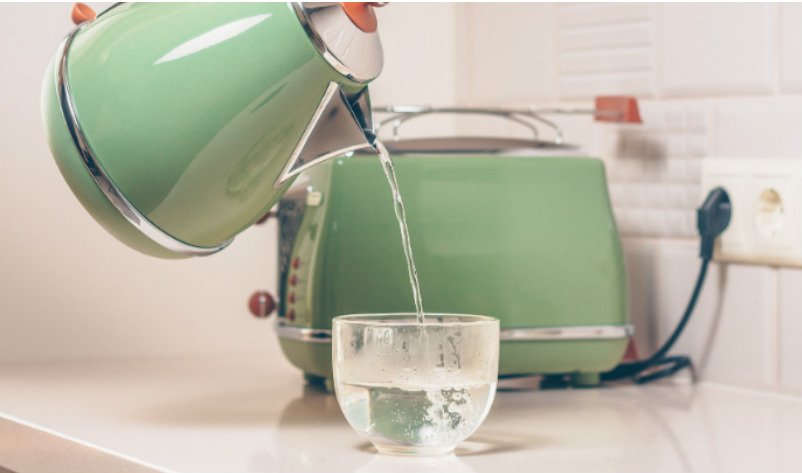Would the circulation and constipation benefits indicate that your doctor should start this as an immediate protocol post-stroke? Or can't your doctor put two and two together without clinical proof that it works? What is the downside? Do not do this on my recommendation, I'm not medically trained. Is your doctor?
10 health benefits to make you start drinking hot water
Naveed Saleh, MD, MS, for MDLinx | March 28, 2019
For centuries, practitioners of Eastern
medicine have recommended beginning the day with a glass of hot water
(roughly 120° to 140° F) to kick-start the metabolism.
With a wide array of beverage choices, hot water is probably the simplest option (aside from cold or lukewarm water). But is it beneficial for health?
Let’s look at 10 benefits of drinking hot water (with or without lemon, depending on your preference).
According to the authors: “Cold water could increase LES resting pressure, prolong the contraction duration of esophageal body, and exacerbate achalasia symptoms. Hot water could reduce LES resting pressure, assist LES relaxation, shorten the contraction duration of esophageal body, and relieve symptoms. Thus achalasia patients are recommended to eat hot and warm food and avoid cold food.”
A dearth of scientific research exists on the relationship between drinking hot (or warm) water and health. Most of these recommendations are based on expert opinion. Nevertheless, it makes sense that hot water proffers plenty of health benefits.
What doesn’t make sense, however, is drinking scalding water (140° F and above) that may burn your tongue, taste buds, and internal organs. Doing so not only hurts, but it could raise your cancer risk. An emerging body of research is investigating the link between ingestion of very hot tea and esophageal damage and esophageal cancer.
With a wide array of beverage choices, hot water is probably the simplest option (aside from cold or lukewarm water). But is it beneficial for health?
Let’s look at 10 benefits of drinking hot water (with or without lemon, depending on your preference).
Weight loss
According to experts, hot water consumption in the morning preps your gut for the rest of the day and may contribute to weight loss. Specifically, it clears the intestines, prevents bloating, and gets rid of excess water weight via contraction of the bowels. It also increases core body temperature, which causes the body to expend energy to lower its temperature back to normal. This energy expenditure promotes metabolism.Nasal congestion
In a small study designed to determine whether consuming chicken soup cleared nasal congestion, investigators found that drinking hot water boosted nasal mucus velocity almost as much as chicken soup did—and both beat cold water. Of note, the effects subsided within 30 minutes.Circulation
Like taking a warm bath, drinking a hot cup of water increases blood circulation through arteries and veins. More efficient blood flow can have benefits ranging from improved blood pressure to decreased risk of heart disease.(Maybe more oxygen rich blood delivered to the brain.)Dental health
Drinking hot water is better for your teeth. Cold water may cause filling materials to contract and break off, thus destroying dental work. Some experts recommend brushing with warm water, too.Digestion
Hot water dilates blood vessels in the gut, which helps with digestion. This boost is most notable when hot water is consumed at the beginning of the day. Drinking hot water after a meal emulsifies fats, which also aids digestion. Drinking a cup of hot water before bed may increase satiety and curb the desire to snack in the middle of the night.Muscle relief
Drinking hot water increases blood flow, helping your muscles to relax, whereas drinking cold water causes them to contract. This muscle relaxation can aid with a wide range of pains, from menstrual cramps to arthritis. It can also help you sleep.Mood
Although not a focus of their study, researchers found that the consumption of hot water likely contributed to improved mood among participants.Toxins
Drinking hot water not only raises your core temperature but also triggers your endocrine system. These effects cause sweating and the release of toxins through the skin.Achalasia
In a study published in the Journal of Neurogastroenterology and Motility, researchers found that drinking hot water—as opposed to cold water—could help improve swallowing in people with achalasia (ie, difficulty swallowing because the lower esophageal sphincter [LES] doesn’t relax).According to the authors: “Cold water could increase LES resting pressure, prolong the contraction duration of esophageal body, and exacerbate achalasia symptoms. Hot water could reduce LES resting pressure, assist LES relaxation, shorten the contraction duration of esophageal body, and relieve symptoms. Thus achalasia patients are recommended to eat hot and warm food and avoid cold food.”
- See Also: How does coffee fight cancer?
Constipation
As noted above, hot water helps the bowels contract. When your bowels contract, you defecate more easily. So, drinking hot water regularly helps keep you regular.A dearth of scientific research exists on the relationship between drinking hot (or warm) water and health. Most of these recommendations are based on expert opinion. Nevertheless, it makes sense that hot water proffers plenty of health benefits.
What doesn’t make sense, however, is drinking scalding water (140° F and above) that may burn your tongue, taste buds, and internal organs. Doing so not only hurts, but it could raise your cancer risk. An emerging body of research is investigating the link between ingestion of very hot tea and esophageal damage and esophageal cancer.
 Drinking hot water—not boiling hot, though—helps digestion, circulation, and even nasal congestion.
Drinking hot water—not boiling hot, though—helps digestion, circulation, and even nasal congestion.
No comments:
Post a Comment